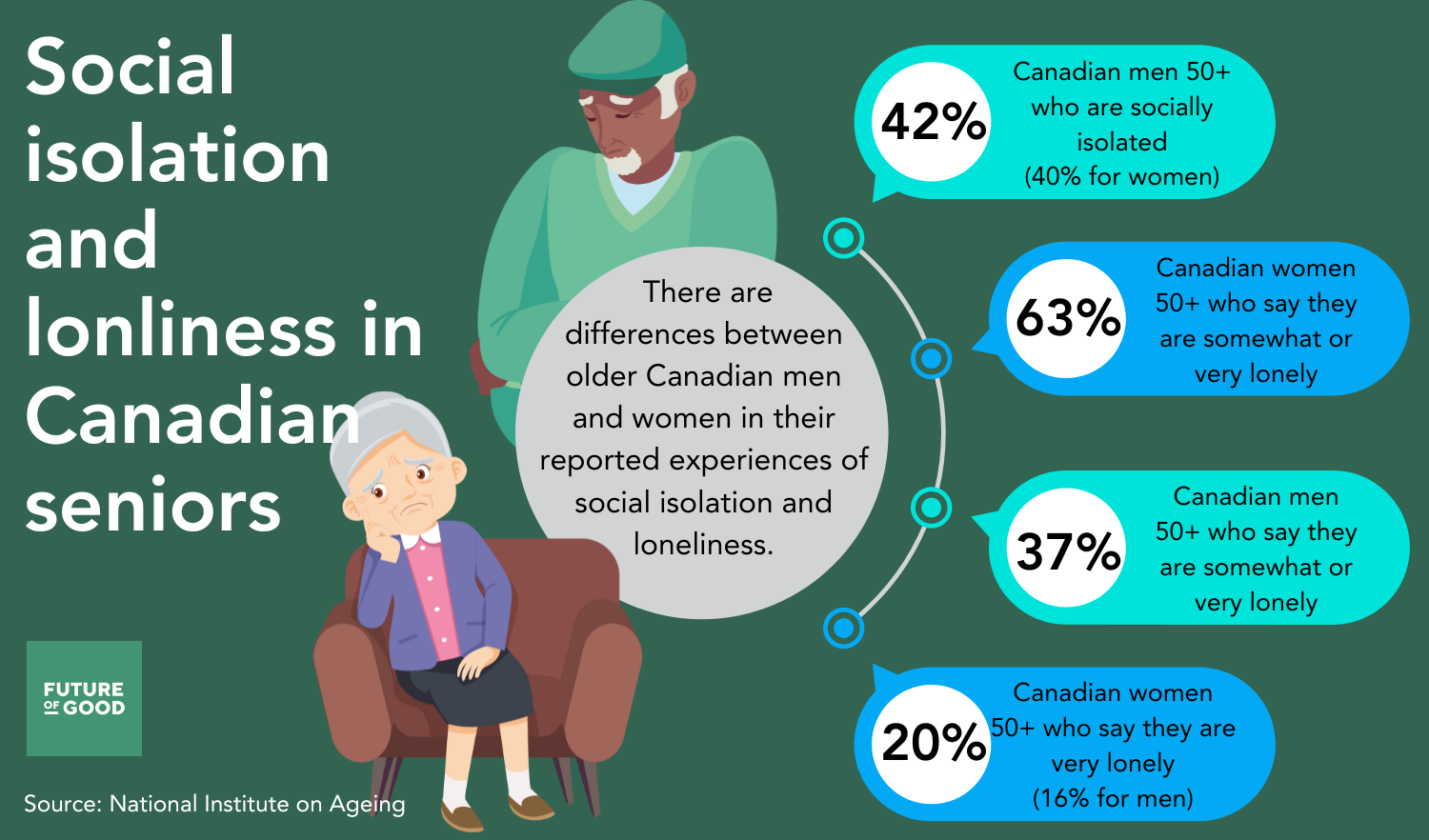Volunteering as an antidote to loneliness
Why It Matters
More than half of Canadians aged 50 or older have experienced loneliness, with 40 per cent experiencing isolation.

This independent journalism is supported by Canadian Tire Jumpstart Charities. See our editorial ethics and standards here.
Once a week, Jo Anne sits down for four hours to talk to people she has never met. She’s retired, happily married with grown children, and has an active social life.
Still, she dedicates this part of her week to volunteering for A Friendly Voice, a service battling loneliness where people can call in for a 30-minute conversation.
“When Covid was coming up, and people were starting to become isolated, we were overseas travelling,” said Jo Anne.
“Everybody was lonely during COVID-19. Everybody was isolated to some degree … I thought it was a perfect time to get more focused and involved in my own community.”
Four years later, the calls are still a part of her weekly routine, and what started as a way to beat isolation and help other people has become a point of connection she looks forward to every week.
“I’m home-based, and it’s all online, so it easily accommodates my availability. I like having a time that commits me to be in,” Jo Anne said.
“I just come in and get my tea, get all organized, get online, and wait for the calls … it energizes me, keeps me in touch with parts of people’s lives that I haven’t lived. I’m happy about that.”
Like Jo Anne, Kim is married with grown children and a volunteer for A Friendly Voice. She has an active social life and regularly skis at the local club.
However, she explains that retirement left her feeling like she had lost a sense of purpose.
“When I retired, I realized a large part of who I was had been left at work,” she said.
“I think volunteer work gives you a purpose or a reason for being outside of yourself. It just makes me feel like I have a purpose in life, that I’m doing good in the world, I’m contributing to my community, maybe not at work, but in a different way.”
The perils of loneliness
Volunteers like Kim and Jo Anne play a vital role in the lives of many people caught in the grips of a loneliness epidemic.
Many of the people who call into A Friendly Voice are home-bound and isolated due to illness, disability, or lack of transportation. Jo Anne explained she has many callers who are also retirees who call in regularly to have a point of human interaction.
In Canada and worldwide, the levels of loneliness have been consistently rising. Driven by the aftermath of the COVID-19 pandemic and an aging population, now more than half of Canadians aged 50 or older have experienced loneliness, with 40 per cent experiencing isolation.
“Everything was intensified during COVID, so what was already there just became very evident,” said Nora Spinks, chair of Canada’s National Senior Council and an expert in aging and seniorhood.
“Now people are following it to see how well we are doing post-Covid. The bottom line is we’re not doing very well at all.”
Loneliness and isolation increase with age, she explained.
“When we look at seniorhood, we look at roughly three phases. Young seniors tend to be very active in their communities. They tend to be very engaged. They’re not yet fully fledged into a second stage, which is when you’re starting to decline in health, energy, and financial resources. That’s a period of loss.
“You lose your driver’s license and your independence, and the third stage is your more vulnerable stage where you depend on others.”
Declining independence and mobility make even simple engagement in the community, like participating in town hall meetings or shopping, more complicated, causing seniors to retreat further as they age.

Isolation can have devastating consequences, and for seniors, the consequences of loneliness are particularly acute.
In November 2023, the World Health Organisation (WHO) called loneliness a “global public health concern,” causing the equivalent amount of damage to the body as 15 cigarettes a day.
Its damaging effect surpasses those associated with obesity and physical inactivity.
A study conducted by Mount Sinai Hospital found that loneliness contributes to more than 45,000 deaths a year in Canada, increasing levels of depression, dementia, and a decline in cognitive ability.
Isolated citizens are more likely to get ill, and hospital treatment for conditions is more likely to have adverse outcomes. Its effects are particularly prevalent in senior citizens.
The study stated while inexpensive initiatives to combat loneliness exist, governments and groups have yet to implement them.
However, research indicates that volunteering could significantly improve conditions.
Why volunteering could help
Initiatives like A Friendly Voice help hundreds of people with their calls, but volunteering in any non-profit could make a difference.
Young seniors like Kim and Jo Anne are “the peak volunteers in Canada,” said Spinks.
“They’ve got lots of energy, they’ve got lots of time. They’re accustomed to going to work, and now they don’t,” she said.
However, as people grow older, many believe volunteering is out of reach, she added. “Giving seniors knowledge and awareness that these opportunities exist is a big part of the challenge.”
A Canadian National Seniors Council report found that involvement in volunteering initiatives was one way seniors could embark on positive and active aging.
Positive and active aging was found to help prolong independence, ward off memory loss, and prevent health decline.
For Jo Anne and Kim, volunteering has become a part of their life that they plan to continue far into the future.
“You walk away feeling like you’ve done something important for a person,” said Kim.
“If I didn’t have the outside activities that I partake in, I would find volunteering a very comforting thing to do. It would fill my loneliness gap.”
A five-year study published by the American Journal of Public Health found that helping others was strongly linked to positive health outcomes and decreased mortality rates.
Volunteering activities acted as a buffer to the harmful effects of stress on participants, and older volunteers, in particular, could benefit.
“It’s got two-way benefits. It’s not just giving,” said Jo Anne. “I feel engaged because I’m doing something useful, and I think many people want to do something useful. Particularly at this time when you’re not as engaged in working and families, You can become isolated and feel disengaged.”
A Friendly Voice and many other initiatives are based online, meaning that they are easy to access and could appeal to people who cannot travel or engage in very physical tasks. Spinks explains that there are many in-person options, too, that don’t require a lot of physical activity or commitment.
“I think the balance here is making seniors feel welcome to participate and volunteer,” said Spinks.
